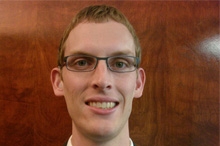Making the World Accessible for Deaf and Hard of Hearing People
 Andrew Phillips is being honored as a Champion of Change for embodying the next generation of leadership within the disability community and his commitment to the promise of the Americans with Disabilities Act.
Andrew Phillips is being honored as a Champion of Change for embodying the next generation of leadership within the disability community and his commitment to the promise of the Americans with Disabilities Act.
I am deaf and the world is often inaccessible to me. This inaccessibility is not because I cannot hear, but because many things are designed without people like me in mind. As a result of this unintended design, I am left out and not able to fully participate in society. I’m unable to understand announcements on trains, enjoy in-flight entertainment on planes, and watch many videos online. But this does not have to be. As a lawyer at the National Association of the Deaf (NAD), I am part of a committed group of disability rights advocates who are working to change the world.
In the last few years we’ve been working on the implementation of the Twenty-First Century Communications and Video Accessibility Act of 2010 which requires that videos shown on television with captions must also be captioned when shown online afterwards. With this change, deaf and hard of hearing people who previously could not understand hundreds of thousands of hours of online content now have full access. However, much work remains to be done because, even with this law, deaf and hard of hearing people are still denied access to many online videos such as newly released movies and the growing number of online-only programs.
The NAD has also persuaded two major online video programming distributors to caption all of their online video content despite gaps in certain laws. We hope that more distributors will follow their lead and recognize the importance of providing access to 48 million deaf and hard of hearing Americans. Our advocacy efforts have even led to the development of new ways for people to add captions to their personal online videos.
I was born in the early 1980s and grew up as a child of the Americans with Disabilities Act. Growing up, I had much more access than older generations of deaf and hard of hearing people, as I had the benefit of captioned television programs, telephone relay systems, and the provision of communication access in law school. I owe a great deal of gratitude to the disability rights champions who came before me, and I stand on the shoulders of giants as I fight for more change – so that the next generation will have full and equal access, including the enjoyment of all online programming, in-flight entertainment, as well as being able to receive accessible public announcements. I look forward to the day when I and others like me will be fully included in the communications of our society.
Andrew Phillips is the Policy Counsel at the National Association of the Deaf in Silver Spring, MD. His disability advocacy work has taken him from his hometown Berkeley, CA to the plains of Siberia and into the halls of Congress.
White House Blogs
- The White House Blog
- Middle Class Task Force
- Council of Economic Advisers
- Council on Environmental Quality
- Council on Women and Girls
- Office of Intergovernmental Affairs
- Office of Management and Budget
- Office of Public Engagement
- Office of Science & Tech Policy
- Office of Urban Affairs
- Open Government
- Faith and Neighborhood Partnerships
- Social Innovation and Civic Participation
- US Trade Representative
- Office National Drug Control Policy
categories
- AIDS Policy
- Alaska
- Blueprint for an America Built to Last
- Budget
- Civil Rights
- Defense
- Disabilities
- Economy
- Education
- Energy and Environment
- Equal Pay
- Ethics
- Faith Based
- Fiscal Responsibility
- Foreign Policy
- Grab Bag
- Health Care
- Homeland Security
- Immigration
- Innovation Fellows
- Inside the White House
- Middle Class Security
- Open Government
- Poverty
- Rural
- Seniors and Social Security
- Service
- Social Innovation
- State of the Union
- Taxes
- Technology
- Urban Policy
- Veterans
- Violence Prevention
- White House Internships
- Women
- Working Families
- Additional Issues

